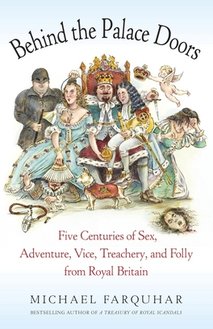
03 Mar 2011 05:33:02
Author Michael Farquhar is a writer and editor at The Washington Post who specializes in history. He has produced books about royal scandals, American scandals, liars, misleaders and forgotten Americans such as pirates and skinflints.
George VI, Britain's World War II monarch, is an exception among a score of sinners, clowns and mediocrities in "Behind the Palace Doors: Five Centuries of Sex, Adventure, Vice, Treachery, and Folly From Royal Britain." He won not only the battle against his youthful stutter, portrayed in the Oscar-winning film "The King's Speech," but also a struggle that may have been tougher for a trained naval officer, a veteran of World War I: He decided to stay away from the D-Day landings in France.
"I don't think I need emphasize," he wrote Prime Minister Winston Churchill, "what it would mean to me personally, and to the whole Allied cause if at this juncture, a chance bomb, torpedo, or even a mine, should remove you from the scene."
He did need to emphasize, asking Churchill in another letter: "... (I)s it fair that you should do exactly what I should have liked to do myself?" Churchill deferred, grumbling.
The book starts more than four centuries earlier with Henry VIII, in his youth an athlete as well as a scholar, linguist and musician. By his early 50s he was "so overgrown with corpulency and fatness," say the chroniclers, he had to be hoisted onto his horse and up flights of stairs.
Farquhar sympathizes with the horse and with teenager Catherine Howard, the fifth of Henry's six consecutive queens. Henry had two of them beheaded, including Catherine. She's not to be confused with Catherine of Aragon, his first wife. He divorced her, a Catholic, after more than 20 years of marriage. That was part of his successful effort to set up a new form of Christianity — Anglicanism — and to marry Anne Boleyn.
George VI, Britain's World War II monarch, is an exception among a score of sinners, clowns and mediocrities in "Behind the Palace Doors: Five Centuries of Sex, Adventure, Vice, Treachery, and Folly From Royal Britain." He won not only the battle against his youthful stutter, portrayed in the Oscar-winning film "The King's Speech," but also a struggle that may have been tougher for a trained naval officer, a veteran of World War I: He decided to stay away from the D-Day landings in France.
"I don't think I need emphasize," he wrote Prime Minister Winston Churchill, "what it would mean to me personally, and to the whole Allied cause if at this juncture, a chance bomb, torpedo, or even a mine, should remove you from the scene."
He did need to emphasize, asking Churchill in another letter: "... (I)s it fair that you should do exactly what I should have liked to do myself?" Churchill deferred, grumbling.
The book starts more than four centuries earlier with Henry VIII, in his youth an athlete as well as a scholar, linguist and musician. By his early 50s he was "so overgrown with corpulency and fatness," say the chroniclers, he had to be hoisted onto his horse and up flights of stairs.
Farquhar sympathizes with the horse and with teenager Catherine Howard, the fifth of Henry's six consecutive queens. Henry had two of them beheaded, including Catherine. She's not to be confused with Catherine of Aragon, his first wife. He divorced her, a Catholic, after more than 20 years of marriage. That was part of his successful effort to set up a new form of Christianity — Anglicanism — and to marry Anne Boleyn.

